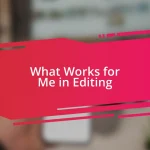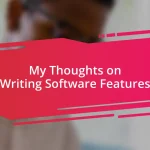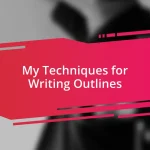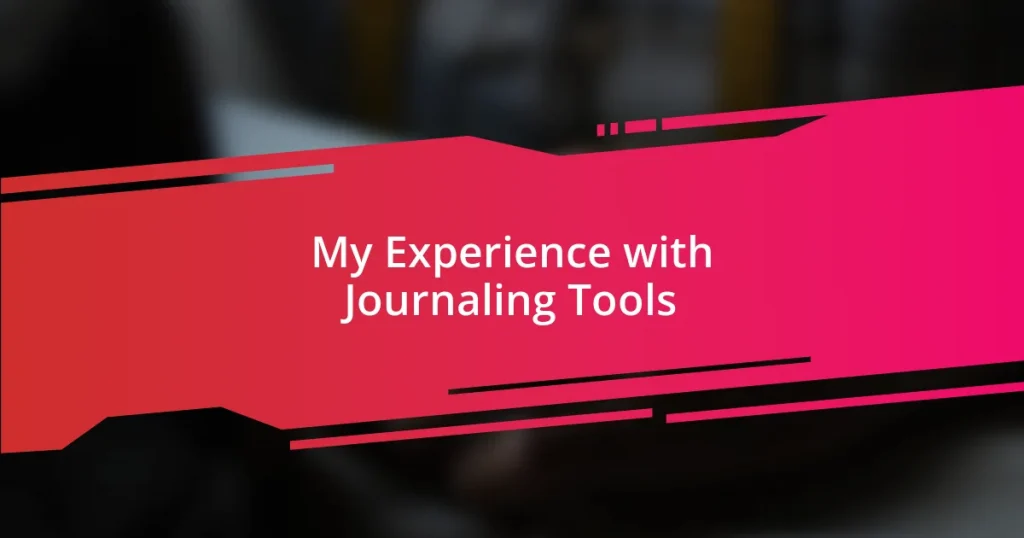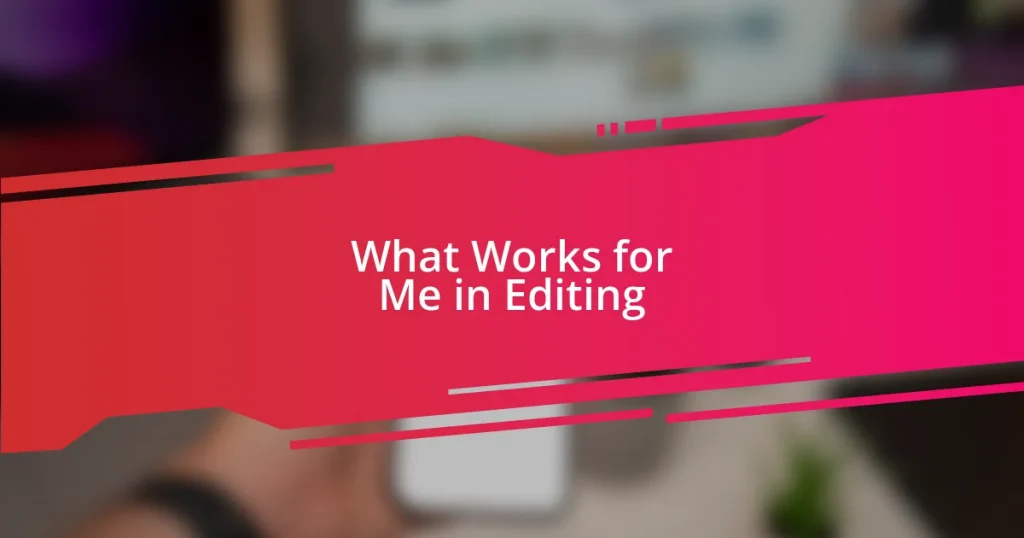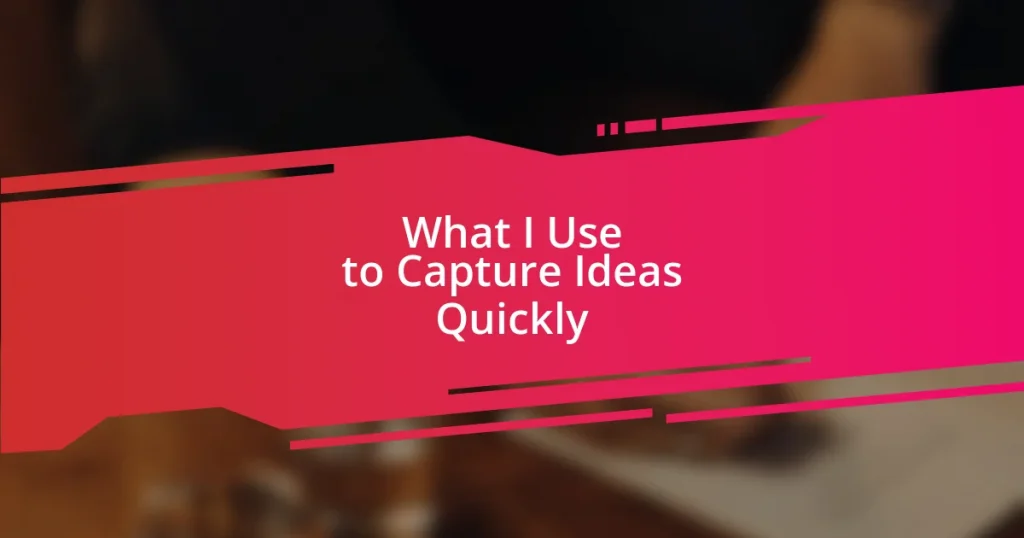Key takeaways:
- Journaling tools enhance self-discovery and emotional healing through personalized expression and reflection.
- Different tools, such as traditional notebooks, bullet journals, and digital apps, cater to varying preferences and needs in journaling practices.
- Establishing a routine, being honest in writing, and incorporating visual elements can significantly improve the journaling experience and foster personal growth.
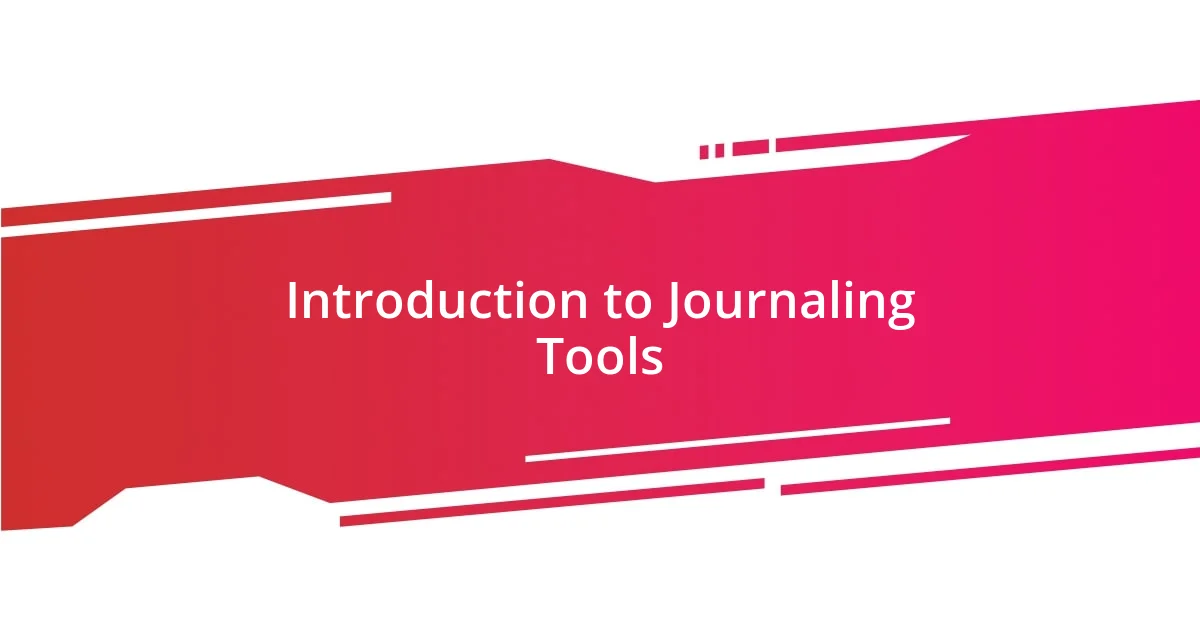
Introduction to Journaling Tools
Journaling tools are more than just blank pages or digital apps; they’re gateways to self-discovery and reflection. When I first started journaling, I was overwhelmed by the options available—notebooks, planners, apps, and even voice journals. Have you ever found yourself unsure of where to begin? I certainly did, but each tool I explored brought me closer to understanding my own thoughts and emotions.
There’s something deeply personal about choosing how to capture your experiences. For instance, I gravitated towards a beautifully bound notebook; the texture of the pages felt inviting. Writing by hand allowed my thoughts to flow more freely, almost like creating art from my feelings. Have you ever felt that connection with a specific tool? It’s intriguing how a simple choice can enhance the intimacy of the journaling experience.
As I continued my journey with journaling tools, I discovered that they can cater to various needs—whether you aim to track goals, process emotions, or simply record daily events. Different tools resonate at different times, much like how we change throughout our lives. What I realized is that the tool you choose can transform your journaling practice; it’s about finding what truly aligns with your unique voice. Have you found your perfect match yet?
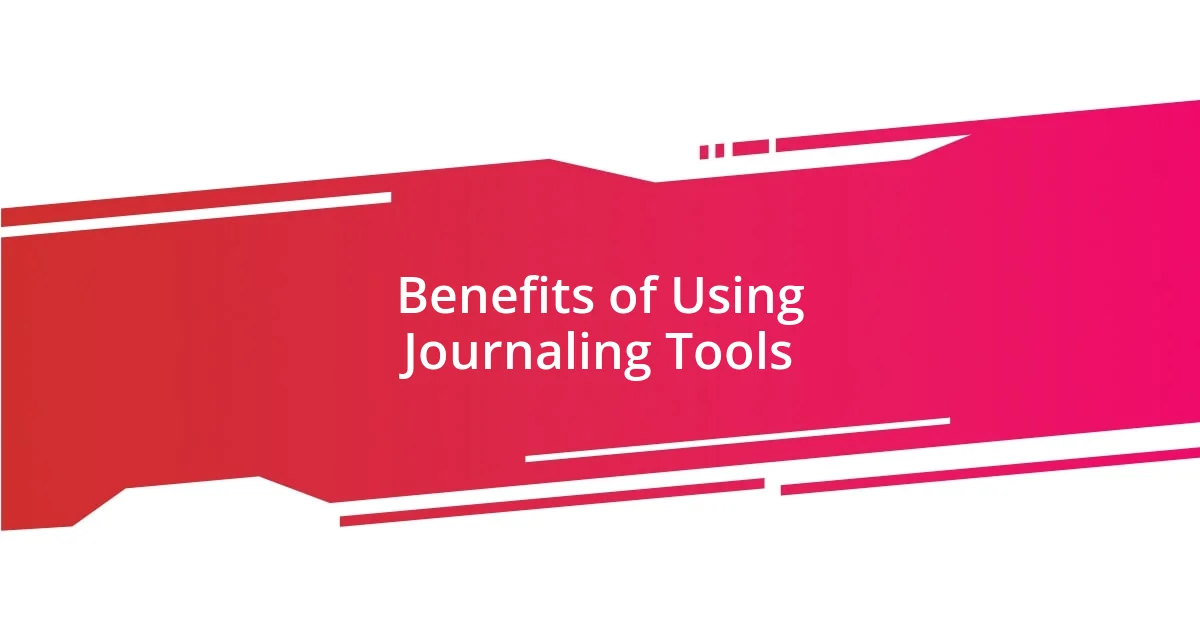
Benefits of Using Journaling Tools
Using journaling tools can unlock a myriad of benefits that enhance both creativity and emotional well-being. For me, keeping a journal transformed my chaotic thoughts into structured clarity. I once struggled with a particularly stressful time at work. As I poured my feelings onto the pages, I found not just relief, but solutions hiding within my own reflections. Have you ever experienced such a breakthrough through writing?
Moreover, journaling tools serve as a perfect companions for self-reflection and growth. I remember using a prompt-based app that helped me explore my values and aspirations. Each question pushed me to dig deeper, revealing truths about myself I hadn’t fully acknowledged. By regularly using such tools, I noticed significant progress in my personal development. Isn’t it fascinating how a few guided questions can spark profound self-awareness?
Another notable advantage is that journaling can boost mental health by providing an outlet for expressing emotions. When I felt overwhelmed or anxious, writing became my sanctuary. It’s like having an honest conversation with myself without judgment. This process allowed me to acknowledge my feelings more openly, leading to significant emotional healing. Have you found journaling helpful in managing your feelings?
| Benefit | Description |
|---|---|
| Clarity | Transforms chaotic thoughts into structured insights through writing. |
| Self-Reflection | Encourages deep exploration of personal values and aspirations with guided prompts. |
| Mental Health | Provides an emotional outlet, aiding in stress relief and healing. |
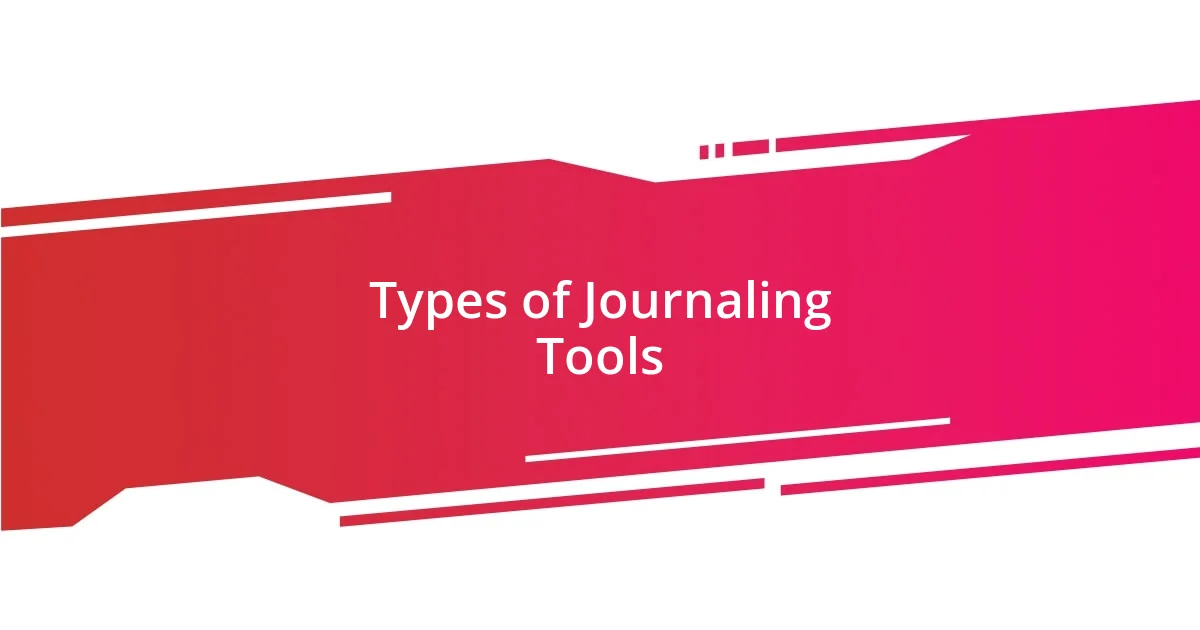
Types of Journaling Tools
When exploring the various types of journaling tools, I found that each offers a unique experience that can cater to different preferences. For a long time, I only used traditional lined notebooks, but then I stumbled upon bullet journaling. This format allowed me to blend creativity with organization seamlessly, and I loved designing my own layouts that reflected my mood for the week. It was like finding a canvas where my thoughts could truly come to life.
Here are some types of journaling tools you might consider:
- Traditional Notebooks: Classic and versatile, they invite free expression without constraints.
- Bullet Journals: Customizable, combining planning and journaling, perfect for the creative mind.
- Digital Apps: Convenient and accessible, they often come with prompts that help structure your thoughts.
- Voice Recorders: A unique way to capture thoughts on the go, great for those who prefer speaking to writing.
- Prompt Cards: These can spark inspiration and challenge your thinking, leading you to new reflections.
Experimenting with these tools has allowed me to discover what resonates with my evolving self. I vividly remember a phase where I took to digital journaling. Its flexibility was liberating! I could write anywhere, anytime, and even incorporate photos and links that enriched my entries. However, the disconnect from pen and paper sometimes felt a bit hollow. I often found myself longing for the tactile pleasure of jotting down thoughts by hand—a sensory experience that no screen can replicate.
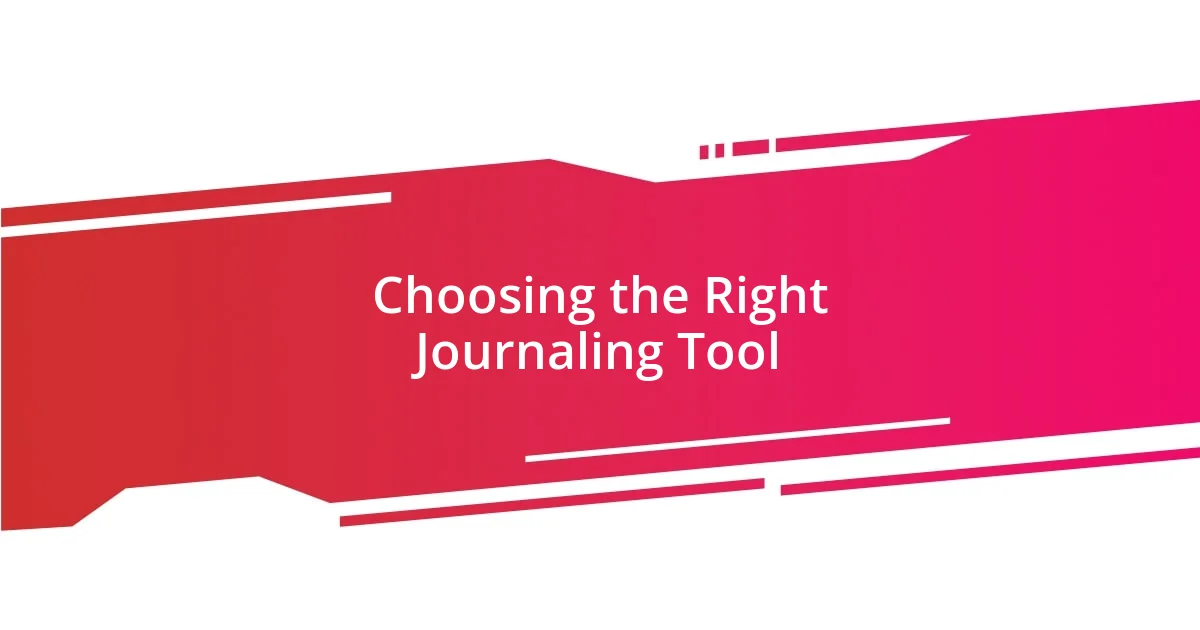
Choosing the Right Journaling Tool
Choosing the right journaling tool can be quite a personal journey. I remember the first time I explored different formats; I was overwhelmed but excited by the possibilities. I gravitated towards apps designed for mindfulness, thinking they would suit my busy lifestyle, but over time, I realized I missed the tactile connection of writing by hand. Isn’t it interesting how our preferences can shift as we grow?
When selecting a journaling tool, consider what resonates most with your intentions. For example, if you aim for self-reflection, a guided journal might provide the structure needed to foster deeper insights. I once used a beautifully crafted journal filled with prompts, and I was amazed at how consistently answering a question could unravel layers of my psyche. Have you found certain formats spark your curiosity in surprising ways?
Lastly, it’s essential to stay open to experimentation. The beauty of journaling lies in its adaptability. I have tried everything from minimalist notebooks to elaborate planners, each serving a different purpose in my life. One week, I found joy in using color-coded pens to illustrate my feelings. Who knew creativity could also be a part of this practice? What tools have you tried, and how have they influenced your journaling experience?
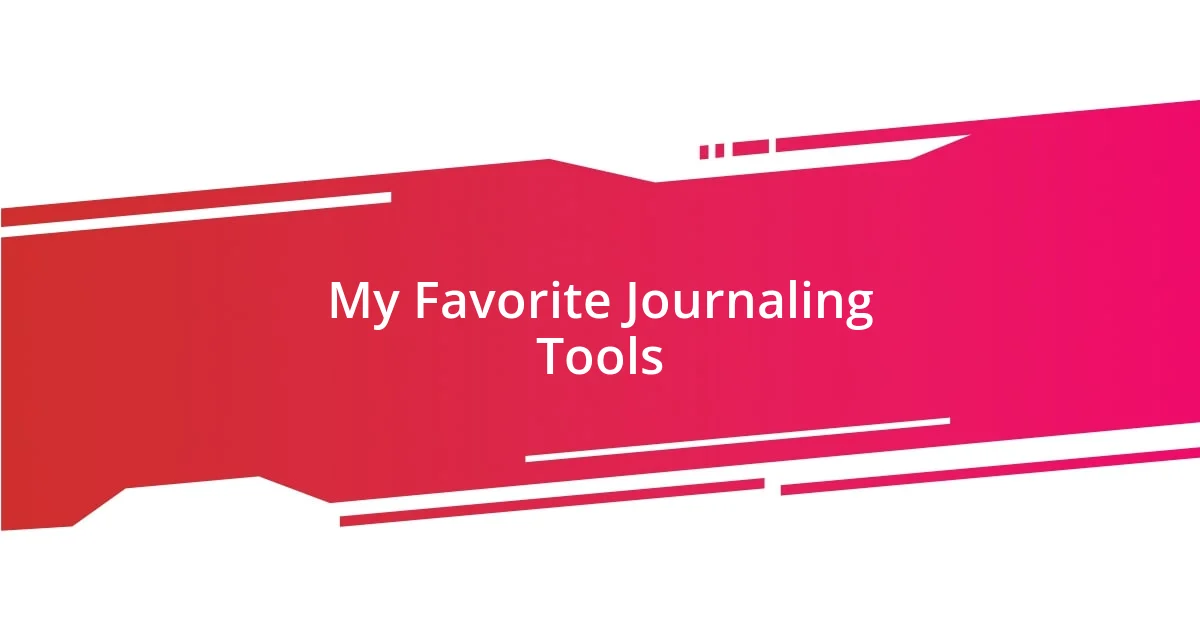
My Favorite Journaling Tools
When it comes to my favorite journaling tools, I can’t help but rave about my trusty Moleskine notebook. There’s something about its sleek design and quality paper that makes every page feel special. I fondly remember a rainy afternoon when I poured my heart out in its pages, the ink perfectly gliding across the surface, each word a small release of emotion. I often find myself reflecting on that moment; it’s simply unmatched.
Then there’s my love for digital journaling apps. They offer such convenience, like when I’m commuting and suddenly overwhelmed with thoughts. I can quickly jot them down on my phone, adding tabs and reminders that make revisiting ideas so easy. Does anyone else appreciate the beauty of having your thoughts neatly organized and just a tap away? For me, this blend of accessibility and organization is invaluable, especially during those chaotic days.
Another favorite is a simple set of prompt cards I stumbled upon at a bookstore. Each day, I would pick one at random, and the questions often pushed me to explore aspects of my life I hadn’t considered. The variety kept my journaling fresh and engaging, transforming mundane days into opportunities for introspection. Do you ever find that a simple prompt can lead to profound realizations? For me, those little cards became gateways to self-discovery, making every journaling session feel like an adventure.
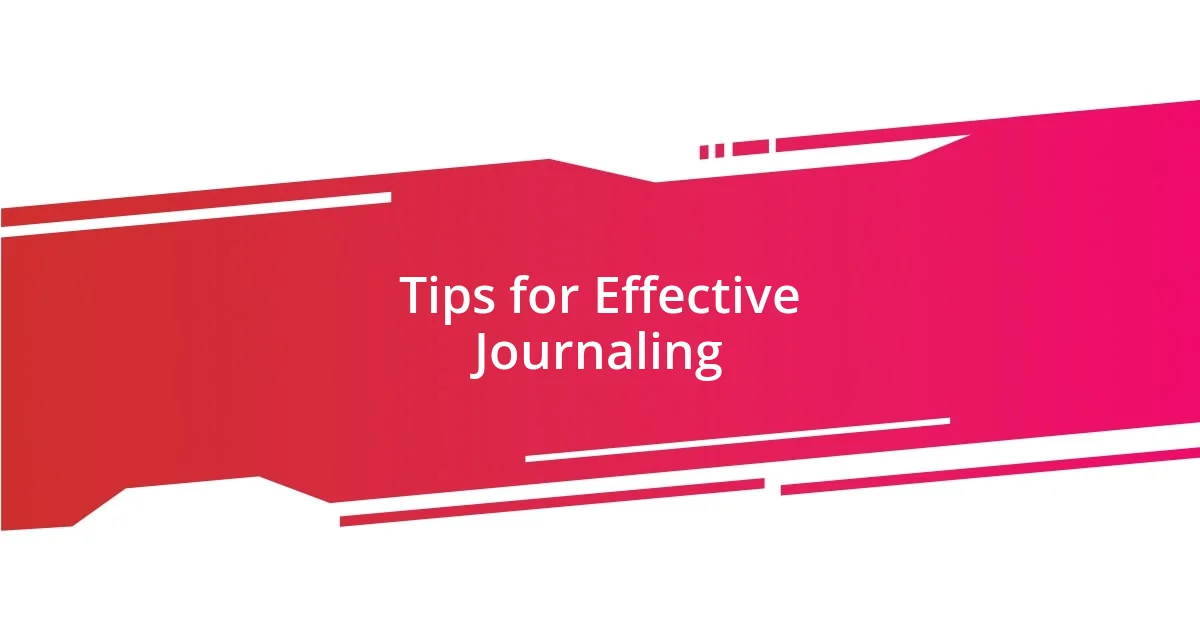
Tips for Effective Journaling
One of the best tips I’ve learned for effective journaling is to establish a routine that works for you. For instance, I’ve found that journaling first thing in the morning sets a positive tone for my day. It’s like letting my thoughts breathe before diving into the chaos. Have you tried journaling at different times? I honestly recommend experimenting with the timing until you discover what feels most aligned with your mindset.
Another valuable tip is to be honest in your writing. I remember a time when I tried to curate my words to sound more polished or insightful, but that just led to frustration. Putting pen to paper, raw and unfiltered, brings a sense of freedom. I often revisit these unedited entries and realize how much growth I’ve experienced. Isn’t it liberating to just let go and write without judgment?
Additionally, incorporating symbols or drawings can elevate the journaling experience. I often doodle little icons next to my entries or use colors to signify my mood. It adds an extra layer to my reflection and makes the process feel less like a task and more like a creative outlet. Have you ever thought of visual expressions enhancing your journaling? For me, that playful addition completely transformed the way I connect with my thoughts.
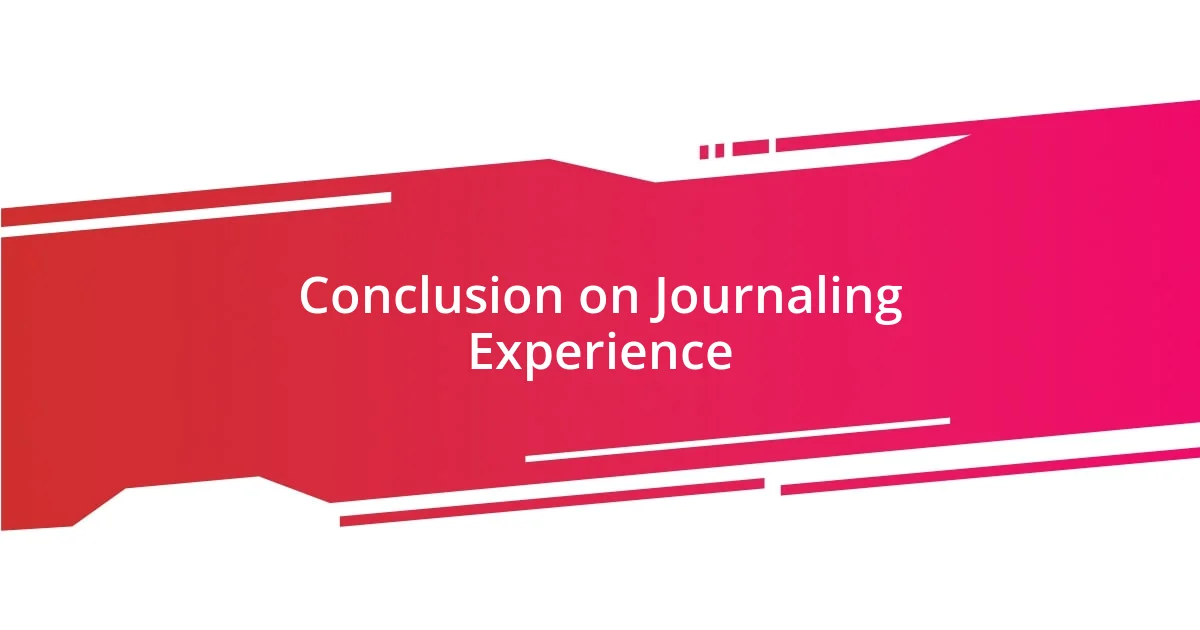
Conclusion on Journaling Experience
Reflecting on my journaling experience, I realize it has been a journey of self-discovery. Each entry captures a moment in time, a snapshot of who I was and what I felt. Have you ever looked back at your writings and felt a rush of nostalgia or even surprise at how much you’ve changed? For me, it’s like opening a time capsule, revealing insights I had long forgotten.
I’ve learned that journaling isn’t just about recording events; it’s a mirror to my soul. There have been days when I felt overwhelmed, and pouring my thoughts onto the page turned my chaos into clarity. Isn’t it fascinating how a simple act of writing can transform confusion into understanding? Those moments of catharsis have often shaped my perspective on life’s challenges.
Ultimately, journaling has provided me with a space to chase my thoughts and emotions without restraint. It’s not merely about crafting neat sentences; it’s about being authentic. I still remember a particularly tough day when just writing the words “I’m struggling” felt like a relief. Have you ever experienced that sense of liberation? Embracing vulnerability in my journal has become a powerful tool for growth, reminding me that every word contributes to my ongoing story.
